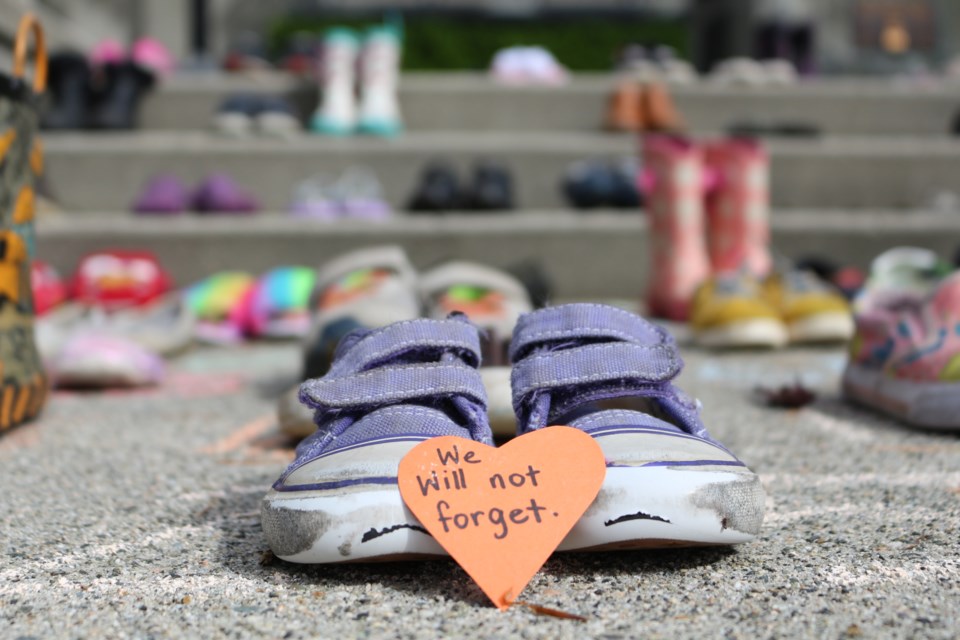Every pair of shoes sitting on the steps at the New Westminster cenotaph remembers a child who never went home.
Every pair remembers a parent who never held their child again. A grandparent who never had a chance to pass on their language and wisdom to a new generation. Another child who saw their brothers, their sisters, their friends disappear and who never knew what became of them.
Every pair stands as a sombre reminder of a past – and a present – that Canada has yet to reconcile.
The memorial outside New Westminster City Hall went up over the weekend in tribute to the 215 children whose lives were lost at Kamloops Indian Residential School. Their bodies were found last week after Tk’emlúps te Secwépemc (previously known as the Kamloops Indian Band) worked with a ground-penetrating radar specialist in a search for answers about what had happened at the institution that was once the largest residential school in Canada. It operated between 1890 and 1978.
The story has since made headlines around the world and renewed a call to investigate the truth of how many children died at residential schools across the country.
Here at home, New Westminster residents are being invited to remember the 215 children by visiting the memorial and adding children’s shoes to the display. It’s set up with numbered spaces marked in chalk, one for each lost child, and residents are now visiting to pay tribute and add shoes. (As of Monday morning, the display stood at about 150 pairs of shoes.)
The display is intended to remain in place until June 8 and then will be stored following the guidance of the Spirit of the Children Society. The city will provide tenting to shelter the display and plastic sheeting on rainy days.
Flags at New Westminster schools and municipal buildings, including city hall, are also flying at half-mast today in tribute to the children.
Mayor Jonathan Cote said city buildings will fly flags at half-mast for 215 hours.
People are also asked to wear their orange shirts today in recognition of the children.
- with files from Castanet
WHAT CAN I DO?
The resident who set up the memorial, who asked not to receive credit, pointed out that paying lip service to the tragedy is insufficient.
“Wearing an orange shirt one day of the year is not enough. We must use our platform, whenever we can, to elevate those who have been silenced. We must speak up, stand up and vote for decolonization,” they said.
Some ideas for those non-Indigenous people wondering how to take action:
- Visit the memorial at city hall. Take a pair of children’s shoes (good, wearable shoes are welcomed because they will likely be donated after the memorial is taken down) and add them so that every child is visualized.
- If you’re a parent, talk over the issue with your children. They are already learning about residential schools in school; educate yourself and keep the discussion open. Not sure where to start? Try this list of books for all ages, from children’s stories to non-fiction for adults, from the Legacy of Hope Foundation.
- Visit the Legacy of Hope Foundation website for more information about residential schools, the Sixties Scoop, Missing and Murdered Indigenous Women and Girls, and the impacts of inter-generational trauma. Donations are also accepted at the site.
- Familiarize yourself with the work of the Truth and Reconciliation Commission of Canada, including the Calls to Action it issued in 2015.
- Urge the federal government to provide funding so that the search for truth about residential school deaths can be conducted at all former school sites across Canada. Locally, New Westminster residents can contact their MP, Peter Julian.
IF YOU NEED HELP
Reconciliation Canada offers a list of places to turn for those residential school survivors and others for whom the recent news has caused trauma. Among them:
KUU-US Crisis Line Society
The KUU-US Crisis Line Society is a 24-hour provincial Aboriginal crisis line.
Phone: Adult Crisis Line 250-723-4050
Youth Crisis Line: 250-723-2040
Indian Residential School Survivors Society (IRSSS)
The Indian Residential School Survivors Society has a 24-hour crisis line.
Phone: 1-866-925-4419
Follow Julie MacLellan on Twitter @juliemaclellan.
Email Julie, [email protected].
NOTE: This story was updated at 2:15 p.m. Monday, May 31 with new information.



